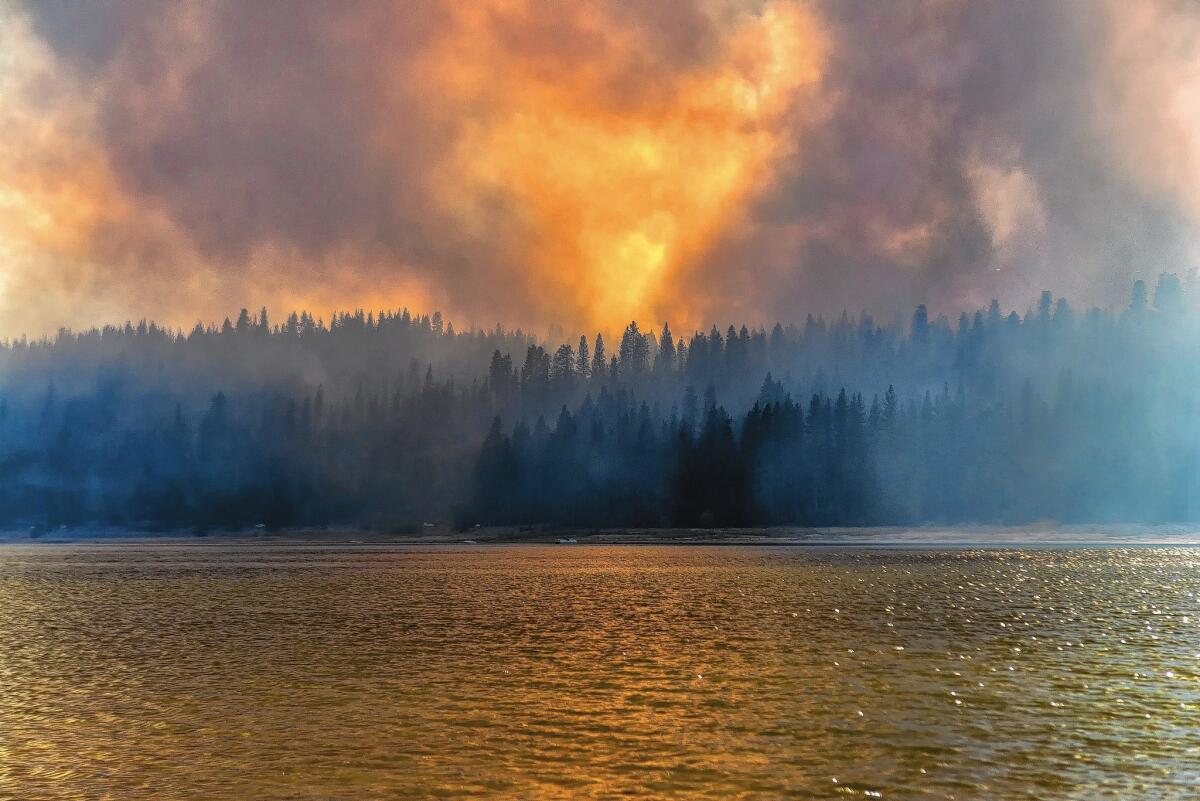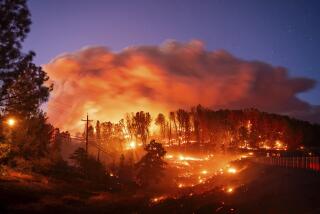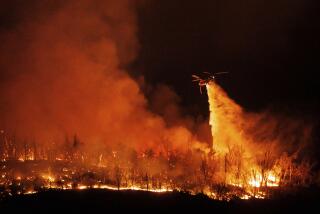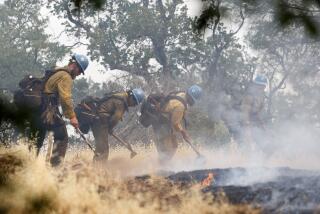Wildfires are becoming a dangerous, disruptive routine near Yosemite

- Share via
Reporting from OAKHURST, Calif. — It has been a summer of foreboding in the mountain communities near Yosemite National Park.
Fires requiring evacuation have arrived one after another — the latest Sunday when the Courtney fire raced through nearby Bass Lake, destroying 33 homes and burning 320 acres.
“We always said it was going to be a tough fight if fire took hold in this area,” said California Department of Forestry and Fire Protection spokesman Frank Bigelow, who grew up in the area. “That nightmare came true last night. It makes us sick.”
It is a fight being waged across California, as about 6,000 firefighters battle a dozen active fires. Officials said late Monday that a fast-moving blaze near Weed, about 50 miles south of the Oregon border, had consumed more than 100 structures.
At Pete’s Place in Oakhurst, waitress Lara Schafter said that when she picked up the phone at her Bass Lake home Sunday afternoon, she knew it was an evacuation order before she heard a word.
“There’s that pause before the recording starts,” said Schafter, 37, who has received three such calls this summer. “I know that pause. I hate that pause. And I know I’m going to hear it again the next fire.”
Schafter stopped to look at the restaurant booth where Anne and Chris Despol were meeting Monday with their insurance agent. Her sigh conveyed another bit of fire routine: knowing others have it worse.
The Despols’ home, the oldest on Cedar Drive — it started out as a cabin in 1904 — was gone.
But they were luckier than most, Anne said. They were summer residents with another house.
“How about the retirees, the people with children who live here full time?” said Anne Despol, 70, who bought the lake home on her 40th birthday. “I keep thinking about homework projects in all that ash.”
Officials said Monday the Courtney fire was 20% contained. Most residents took that to mean the worst was over. The fire engines and the TV news vans would be heading back down the hill. But there was still danger.
A gust of wind in the wrong direction, a hot spot that firefighters missed, and the flames could come back.
Even with the number of major fires in this area since May — Hunter, Valley, Haigh, Junction, Bridge and now Courtney — there is still shock at how fast a blaze can come.
“There was no time to get ready. Nothing. There was just a deputy at the door yelling, ‘Get out now! Get the hell out, and I mean now!’” said Jeanne Martin, 87, whose home of 35 years was destroyed Sunday. “We saved our dog Molly. We didn’t get the cat. If you get in there, please look for a tabby.”
In the burn area, smoke stretched in wisps across what used to be frontyards. As usual, there were a few reminders of what had been there: a twisted mailbox, the frame of a dune buggy, something that might have once been a boat.
Small flames suddenly flared around tree stumps. Firefighters in protective gear stamped them out with shovels. Ominous creaks and groans came from some still-standing trees.
The fire came within three-quarters of a mile of the Bass Lake fire station. Residents applauded firefighters at a community meeting Monday morning.
“Some of them knew by then that their houses were gone. And they still thanked us,” Bigelow said.
On the other side of the lake, the employees at Pines Resort started decorating for Halloween.
Martin, the woman who had lost her house, was at the deli in her wheelchair, picking up dinner for her husband.
“My husband didn’t have time to grab his glasses. I didn’t get my blood-pressure medicines,” she said.
She hadn’t cried when she first saw the photos of their burned home. But now she started sobbing.
“Everything! Everything is gone!” she said.
Her daughter Chris Wallin, 65, tried to end the conversation, but Martin waved her away.
“It feels good to say what happened,” she said. “There always comes a time when you have to cry.”
Twitter: @dianamarcum
More to Read
Sign up for Essential California
The most important California stories and recommendations in your inbox every morning.
You may occasionally receive promotional content from the Los Angeles Times.














